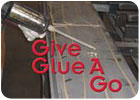
Although the growing market acceptance of adhesives as a cost-effective alternative to welding is intriguing to many, companies with roots and expertise in aluminum welding are often skeptical to give glue a go.
Such was the case for Freeman Marine Equipment Inc., a global leader in marine water-tight and weather-tight closures. The Gold Beach, OR, firm, which offers more styles, sizes and shapes of cast aluminum watertight deck hatches than any other manufacturer in the world, is also known for its custom-fabricated doors, hatches, portlights, windows, and specialty closures, which offer superior sealing performance.
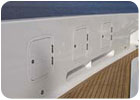
As such, Rogers sought assistance from LORD Corp., a global leader in structural bonding of metal. In concert with LORD® Engineered Adhesives' distributor, Ellsworth Adhesives, LORD account manager Tom R. Reynolds worked to validate that Freeman Marine's double-skin mill-finished aluminum door skins could be adhesively bonded to an extruded aluminum panel frame and withstand the rigors of the blue water ocean environment.
Proven in a variety of end-use markets - including more than 50 million cars, trucks and specialty vehicles worldwide, as well as 100,000 watercraft - LORD adhesives provide exceptional performance and durable bonds to a variety of metal assembly applications, including high-strength bonds to aluminum, steel, and other metals. This was achieved through the replacement or reduction of welding, bolting, riveting and separate sealing steps. When compared to mechanical fasteners and welding, structural adhesives widely distribute stresses, act as a sealant, reduce noise and vibration, offer excellent durability, help prevent corrosion, and maintain the original mill-finish quality of the panel's exterior surface - all improvements that were of interest to Freeman Marine.

Breaking Down the Door
Although the Freeman Marine technicians quickly recognized the ease and time/cost savings associated with adhesives, proof of strength and durability needed to be confirmed. To provide initial performance validation, Freeman Marine challenged their production team to literally "break down the door." A contest that involved taking a sledgehammer to a welded door (as well as a panel) using the LORD adhesives took place. Another competition included mangling a door with a forklift. In both cases, the adhesive-bonded components matched or outperformed the welded components.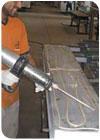
"Using adhesives reduces the cost of door panel fabrication by as much as 35%," said Rogers. "Not only do adhesives reduce the amount of filler material and labor required when doors are painted, but they allow for a totally smooth, unblemished, non-distorted panel that we can otherwise only obtain with costly grinding if the panel is of welded construction."
According to Rogers, the integration of adhesives into their business will allow them to increase productivity to better meet the needs of production-oriented boat builders. In fact, Freeman Marine recently constructed a new 3,250-square-foot facility to house a new laminating press and fixtures to be used in their expanded operations.
"Adhesives are our future," Rogers said. "Not only will they provide a better product for our clients at a reduced price, but they will allow us to supply marine-grade, weather-tight doors to new markets - value oriented applications in non-marine, industrial and commercial applications."
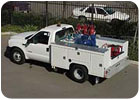
Driving Success with Reduced Labor
Adhesives have proven their worth on land as well. Scelzi Enterprises creates custom truck bodies for a range of customers - from single vehicles for individuals to entire fleets for some of the West Coast's largest companies and utilities. To ensure quality, every step of the manufacturing process happens under their roof, starting with raw sheet metal and ending with finished truck bodies fitted and perfectly color-matched to host cabs and chassis. Each body is carefully caulked inside and out by hand to prevent leaks, rust, and corrosion. After caulking has cured, the body is under-sealed with an oil-based automotive undercoating for added protection.Quality, however, comes at a price. According to Jose Villa, Scelzi Enterprises' shop foreman, the company was looking for a better means of attaching aluminum diamond plate lifts to the top of the service bodies to replace the traditional means of using more than 100 rivets. Although galvanized metal won't rust, drilling holes invites potential corrosion.
"Rivets are effective when used as fasteners, but they simply don't seal properly," Villa said. "We had heard how others in the industry were using adhesives and we decided to try it."
Scelzi chose LORD Engineered Adhesives, distributed by Industrial Solutions Co., for the company's trials and quickly recognized the benefit of adhesives in terms of preventing liquid or water from entering the compartment. The adhesives also proved to be a time saver, decreasing about three hours from the typical prep and painting process. Even more important, said Villa, is the improved quality.
In addition to savings in labor, materials and cost, as well as improved appearance, Villa said adhesives eliminate the visual weld marks that occur on outside panels.
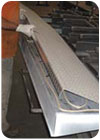
"Adhesives save us time and allow us to provide a better product, plain and simple," said Villa.
For more information, contact Scott Miller, phone (919) 468-5981, ext. 6437, or e-mail scott.miller@lord.com.